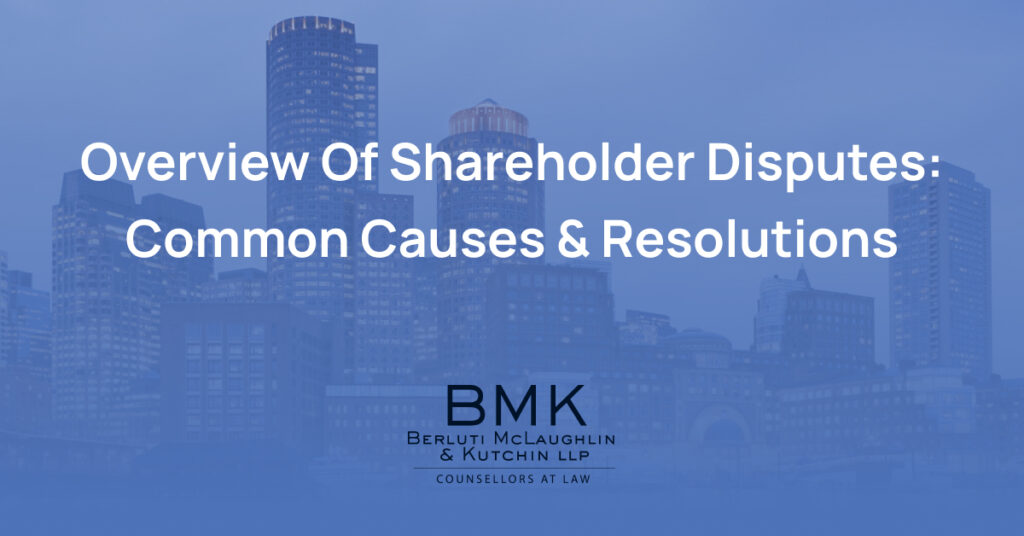
Participating in the business world might be about managing resources, innovation, and providing good service to patrons, but it is also about handling internal disputes.
If you are a Massachusetts business owner, understanding common business disputes and how to resolve them can make all the difference in what you get out of the market.
Berluti McLaughlin & Kutchin LLP is here to help. With decades of combined experience and multiple awards from the legal community, our business attorneys bring insight, strategy, and professionalism to your side.
Your Rights and Duties in the Business World
Shareholders, members and partners make up a business’ backbone by investing their money in its vision in exchange for a financial return. As a shareholder, you typically have the following rights:
- The right to access certain company records,
- The right to vote on corporate decisions,
- The right to attend regular meetings,
- The right to receive financial distributions from the business, and
- Any other rights outlined in the corporation’s bylaws or articles of incorporation.
These rights also come with obligations, such as following company bylaws, making proper requests to inspect records and receive distributions, and properly voting according to your shares and company rules.
Each company’s rules can differ, but our team at BMK can walk you through what you are entitled to and what actions you must take to preserve your rights as a shareholder.
Director and Officer Rights and Obligations
Directors and officers have unique roles in guiding a business’ success and must act in the company’s best interests.
While they have the right to make or carry out critical decisions, they must exercise a duty of care toward the business, remain loyal, and properly disclose conflicts of interest to the company.
Directors who neglect their duties can be held liable for actions that harm the company. If you are a director or officer, we can help clarify your role and responsibilities and shield you from unnecessary risk.
Company Disputes Between Directors or Officers
Company disputes between directors or officers often arise over alleged breaches of duty, such as:
- Making a damaging decision or taking a harmful business action that is an undisclosed and material conflict of interest;
- Authorizing an improper distribution;
- Improperly withholding a distribution; or
- Engaging in an unreasonable business activity, such as relying on clearly uninformed advisors or making risky financial investments.
Sometimes, disputes arise internally between board members. Other times, disputes come from shareholders questioning a director’s decisions.
BMK is skilled at helping directors resolve these conflicts while focusing on a company’s success and our client’s rights.
Shareholders can face disputes over the following:
- Dividend distributions and freeze-outs,
- Voting rights,
- A lack of transparency within the corporation,
- Meeting rights, and
- Whether directors or officers are performing their corporate duties with reasonable care.
We are here to guide shareholders through these challenges while advocating for fair treatment and open communication.
Internal Dispute Resolution
Internal dispute resolution is often the best route for maintaining goodwill and avoiding costly litigation. Many corporations have established processes, such as mediation or arbitration, to handle disagreements before they escalate.
Depending on the nature of the dispute, shareholders or directors can vote on a matter to resolve it. Votes can occur during a special or regularly scheduled meeting or by consent of voting shareholders.
We have extensive experience helping businesses set up and manage internal procedures to preserve a company’s reputation and relationships.
Dispute Resolution Through a Civil Suit
Taking business fights to civil court may be the most stressful option, but sometimes it is necessary. If an internal solution is not possible for director, officer, or shareholder dispute resolution, a civil suit may be your best option. These civil suits come in two main flavors: direct and derivative.
Direct lawsuits
A shareholder may sue the business to receive the payment distribution they were entitled to receive from their shares. Shareholders, officers, or directors of a business might also be able to sue when a director or officer violates the terms of the corporation’s bylaws or articles of incorporation.
BMK can represent your interests in court. Our skilled litigation team prepares strong cases, whether you are defending against a claim or seeking justice for a wrong.
Derivative lawsuits
In a derivative action, shareholders or members sue a party on behalf of the business. If someone within a business takes harmful action against the business or action in violation of the business’s management documents and the company fails to address the matter, a member or shareholder can file a lawsuit for the company in an attempt to fix the issue.
Violations a plaintiff in a derivative suit might sue for could include:
- Improper shareholder distributions,
- A director’s or officer’s breach of fiduciary duty to the company,
- A director’s failure to disclose a conflict of interest, or
- A director or officer taking unreasonable actions on behalf of the corporation.
Starting a derivative suit or initiating any type of dispute resolution in a corporate setting can be a nuanced process that involves contract, statutory, and personal issues.
But you don’t have to sift through the complexities alone. Our experienced business attorneys can set the issues straight for you and help you get the best relief.
We Can End the Tension in Your Business Relationships
Our award-winning attorneys at BMK bring clarity, strategic thinking, and a wealth of experience to every case. We are here to safeguard our client’s interests and keep their businesses on track.
Let us help you resolve your corporate dispute so you can focus on what matters most: your business’s success. Please call us or contact us online to schedule an appointment.
Resource List
- Mass. Gen. Laws, Title XXII, Chapter 156, §32, link
- Mass. Gen. Laws, Title XXII, Chapter 156D, §8.42, link
- Mass. Gen. Laws, Title XXII, Chapter 156D, §8.30, link
- Mass. Gen. Laws, Title XXII, Chapter 156D, §8.31, link
- Mass. Gen. Laws, Title XXII, Chapter 156, §10, link
- Mass. Gen. Laws, Title XXII, Chapter 156D, §7.02, link
- Mass. Gen. Laws, Title XXII, Chapter 156D, §7.04, link
- Mass. Gen. Laws, Title XXII, Chapter 156D, §13.30, link
- Massachusetts Rule of Civil Procedure 23.1, link



